RBT Renewal Application
Maintaining Excellence in ABA Therapy: The RBT Renewal Process
Understanding the Role and Renewal of Registered Behavior Technicians
Registered Behavior Technicians (RBTs) constitute a vital part of the ABA therapy workforce, directly implementing behavioral interventions under the supervision of Board Certified Behavior Analysts (BCBAs). This article explores the RBT certification renewal process and its importance in sustaining high-quality care for individuals with autism and related developmental disorders.
The Foundations of ABA Therapy and the Role of RBTs
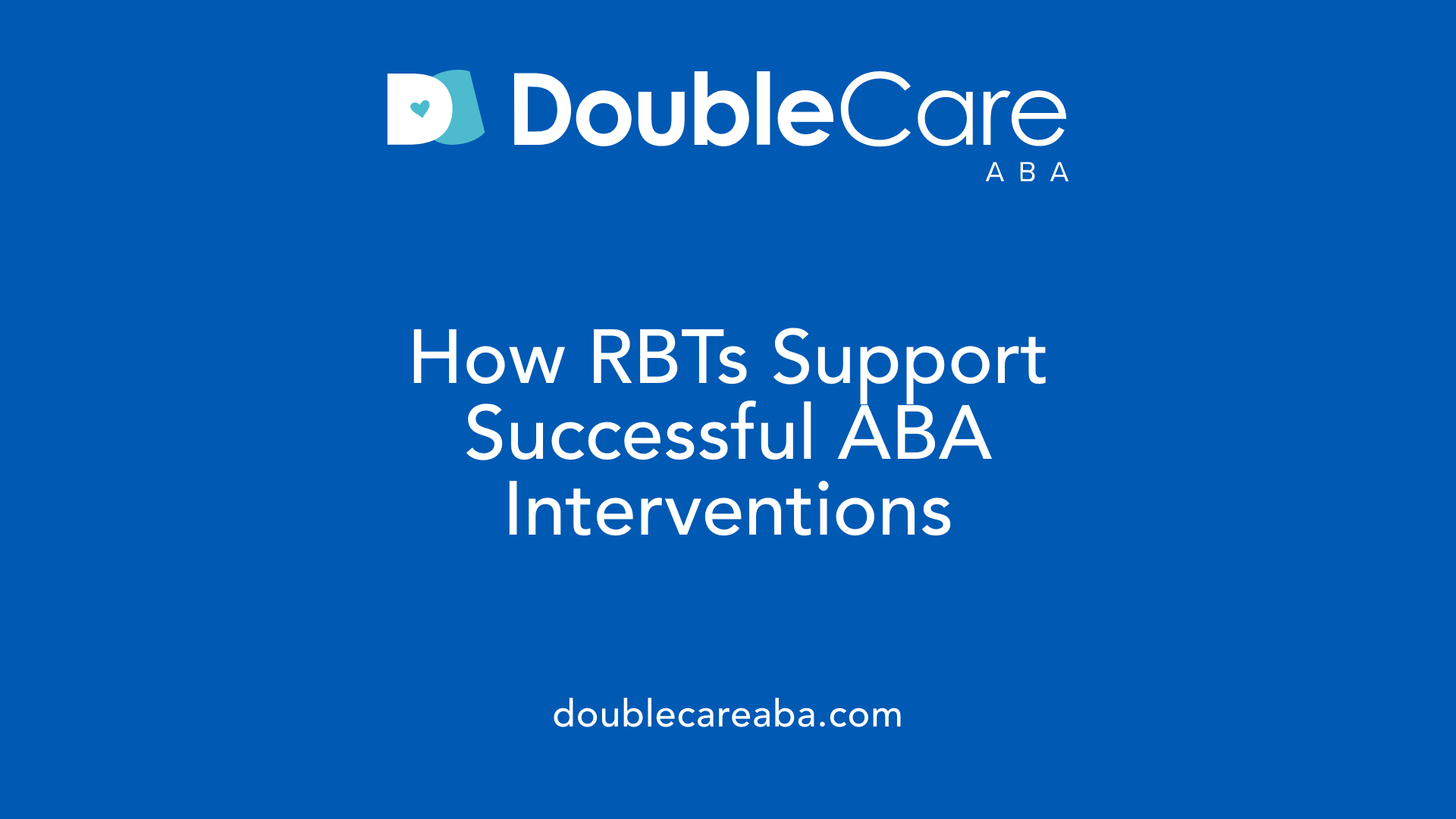
What is ABA therapy and how is it used to support individuals with autism?
Applied Behavior Analysis (ABA) therapy is a scientifically supported method designed to help individuals with autism develop meaningful skills and reduce behaviors that may limit their learning or social engagement. This approach uses principles of behavior and learning science to build communication, social abilities, and self-care through positive reinforcement.
ABA programs are carefully tailored to each person's unique needs, using systematic assessments performed by Board Certified Behavior Analysts (BCBAs) who design individualized treatment plans. Typical ABA therapy involves intensive sessions, commonly ranging from 10 to 20 hours per week, emphasizing measurable progress and skill acquisition using techniques like the antecedent-behavior-consequence model.
How ABA supports individuals with autism
ABA focuses on teaching socially significant skills by reinforcing desirable behaviors and decreasing challenging ones. It creates supportive learning environments that help individuals reach greater independence and participate more fully in daily activities. Early implementation of ABA therapy is especially effective, empowering children to thrive both socially and academically.
The role of RBTs within ABA therapy teams
Registered Behavior Technicians (RBTs) serve as vital members of ABA teams by directly implementing the treatment plans created by BCBAs. Trained through a 40-hour course and competency assessments, RBTs work under continuous BCBA supervision, ensuring treatment fidelity and ethical practice. They conduct teaching sessions, apply behavioral interventions, and collect data to monitor progress.
While they do not develop treatment plans or perform assessments, RBTs are on the frontlines, providing hands-on support to individuals with autism. They maintain certification through annual renewal requirements, including ongoing supervision and adherence to the RBT Ethics Code, ensuring high-quality care.
Together, BCBAs and RBTs collaborate to deliver effective ABA therapy that enhances skills, promotes positive behaviors, and improves quality of life for individuals with autism.
Qualifications and Training Pathways for RBTs and BCBAs
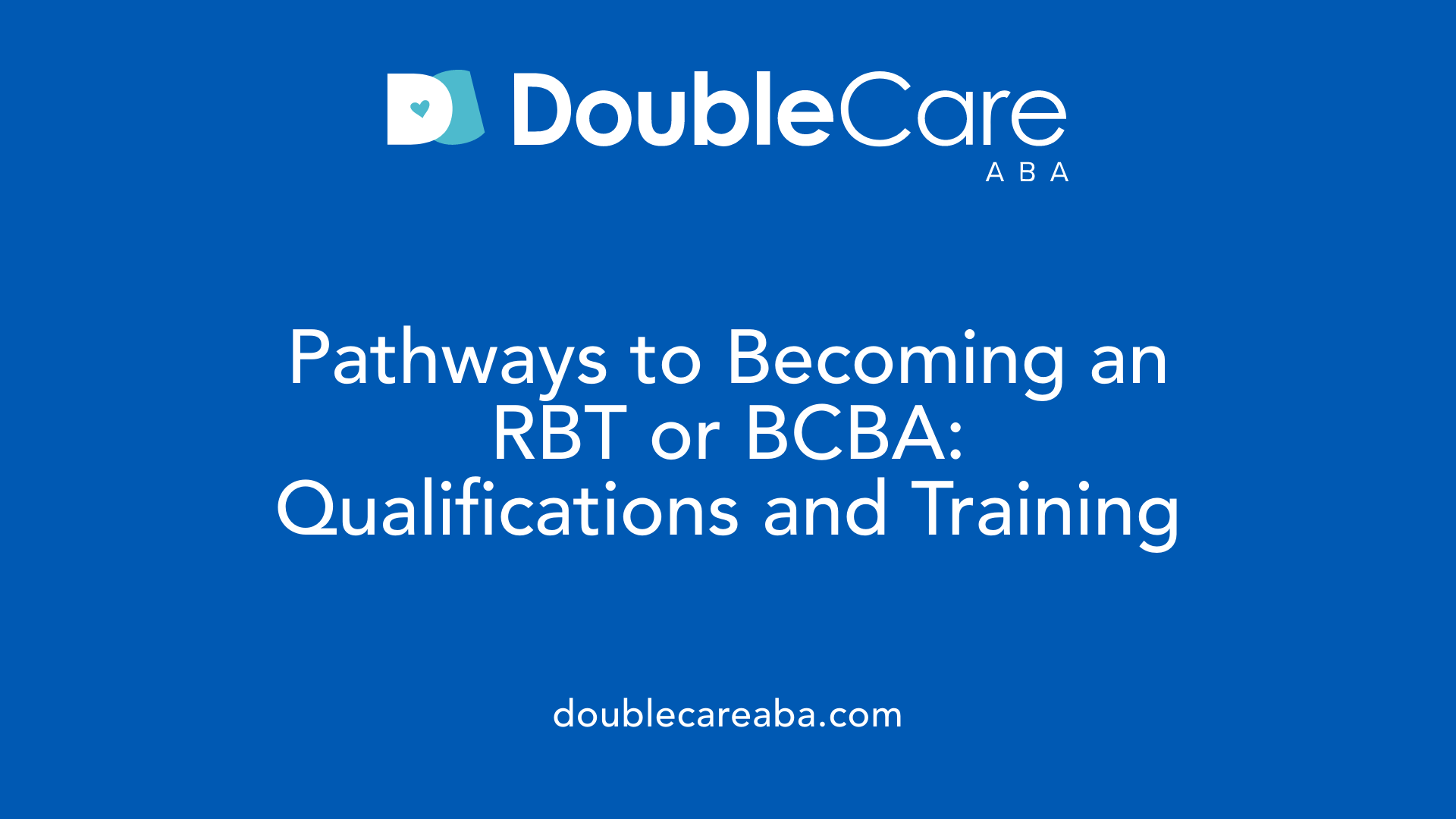
Basic Eligibility Criteria for RBTs
Registered Behavior Technicians (RBTs) must meet several basic eligibility requirements before beginning certification. Candidates must be at least 18 years old, possess a high school diploma or equivalent, and pass a criminal background check. These foundational criteria ensure that individuals working directly with clients meet minimum standards for responsible care.
Training and Certification Process for RBTs
To become an RBT, candidates complete a 40-hour training program based on the RBT Task List, which covers essential topics including ethics and professional conduct for at least three hours. After training, candidates undergo a competency assessment involving direct observation or role play under BCBA supervision. Subsequently, they take a certification exam administered by the Behavior Analyst Certification Board (BACB), consisting of 85 multiple-choice questions on assessment, behavior reduction, skill acquisition, and documentation. The certification costs are relatively affordable, with a $50 application fee and a $45 exam fee. Once certified, RBTs must work under the supervision of a BCBA, ensuring at least 5% of their monthly service time, including two face-to-face contacts, is supervised. Annual renewal requires ongoing supervision, adherence to the RBT Ethics Code, and a renewal competency assessment.
Overview of BCBA Qualifications and Role Distinctions
Board Certified Behavior Analysts (BCBAs) are graduate-level professionals with a master's degree specializing in fields like psychology or behavioral sciences. Their training encompasses at least 315 hours of ABA coursework and 1,500 to 2,000 hours of supervised practical experience. BCBAs are responsible for developing and overseeing behavioral treatment plans, conducting assessments, and communicating progress with stakeholders. Unlike RBTs, BCBAs design the interventions and provide supervision to paraprofessionals. They must pass a comprehensive exam and renew their certification every two years, complying with continuing education and ethical standards. Licensing requirements vary by state.
Who Provides ABA Therapy Services, and What Qualifications Do They Typically Have?
ABA therapy services are delivered by highly trained professionals, primarily BCBAs and RBTs. BCBAs offer advanced expertise in assessment and plan development, while RBTs provide direct implementation of treatment under close supervision. Both roles require certification and ongoing adherence to ethical and professional standards to effectively support individuals with behavioral and developmental challenges, including autism spectrum disorders.
The RBT Certification Process: From Training to Exam
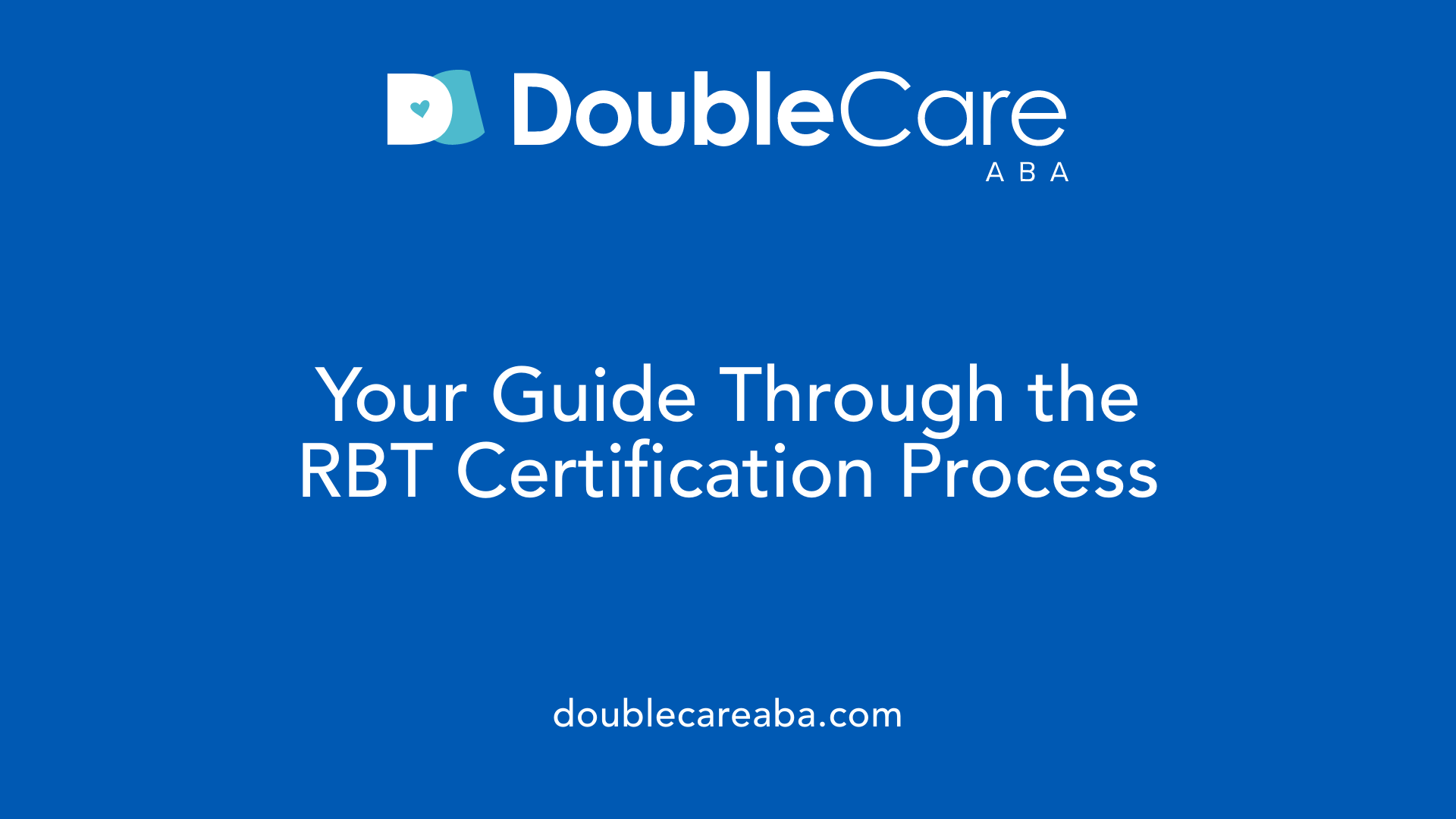
What Are the 40-Hour Training Requirements for RBT Certification?
To become a Registered Behavior Technician (RBT), candidates must complete a 40-hour training program based on the RBT Task List (2nd edition) created by the Behavior Analyst Certification Board (BACB). This training, which can be done online, covers essential topics like measurement, skill acquisition, behavior reduction, and documentation. It also ensures trainees acquire fundamental knowledge and skills to provide quality behavioral services under supervision.
What Ethics Training Components Are Included?
The 40-hour training program includes at least three hours specifically dedicated to ethics and professional conduct. This component teaches prospective RBTs about adhering to ethical standards, protecting client rights, and maintaining professional behavior. Ethics training plays a vital role in preparing RBTs to responsibly support individuals with behavioral challenges.
How Does the Competency Assessment Work?
After completing the training, candidates undergo an RBT Competency Assessment, which must take place within 90 days of applying for certification. A board-certified behavior analyst (BCBA) observes the applicant through direct observation or role-playing scenarios to assess skills in delivering behavioral interventions. Successful completion of this assessment confirms the candidate’s practical readiness to provide services.
What Are the Certification Exam Details and Fees?
Following the competency assessment, candidates must pass the RBT certification exam to earn their credential. The exam includes 85 multiple-choice questions that examine knowledge in measurement, assessment, skill acquisition, behavior reduction, documentation, and professional conduct. The BACB charges a $50 application fee and a $45 exam fee, making the overall certification process relatively affordable. Passing this exam validates the candidate’s comprehensive understanding needed to begin work as an RBT.
Supervision and Compliance: Ensuring Quality ABA Service Delivery
What Are the Supervision Requirements for RBTs?
Registered Behavior Technicians (RBTs) must operate under the supervision of a Board Certified Behavior Analyst (BCBA) to maintain the quality and integrity of applied behavior analysis (ABA) services. Supervision mandates that BCBAs spend at least 5% of the time the RBT is providing ABA services on supervision activities. This includes a minimum of two face-to-face interactions each month.
What Documentation and Face-to-Face Contact Are Mandated?
BCBAs are responsible for documenting supervision activities to ensure compliance with certification standards. The face-to-face contact must be carefully logged and involve direct observation or coaching sessions that assess the RBT’s performance of ABA treatments and data collection.
What Is the Role of BCBAs in Oversight?
BCBAs design, develop, and assess behavioral treatment plans, and they oversee RBTs by ensuring these paraprofessionals correctly implement the prescribed ABA interventions. They also provide feedback, guidance, and coaching to the RBTs to maintain high treatment fidelity.
How Is Supervision Conducted, Including Use of Videoconferencing?
Supervision can take place in person or via videoconferencing platforms. Remote supervision methods have become increasingly utilized, offering flexibility while maintaining rigorous oversight. Regardless of the delivery mode, the essential element is that BCBAs observe RBTs directly to confirm the accurate application of behavioral techniques and compliance with ethical standards.
This structured supervision framework supports effective service delivery and ensures that individuals receiving ABA support benefit from quality and ethically guided practices.
The Renewal Application Process for RBT Certification
Annual Renewal Requirements
Registered Behavior Technicians (RBTs) must renew their certification annually to maintain their professional status. This renewal ensures they continue to meet the standards required to effectively support behavioral treatment plans.
Renewal Competency Assessment
As part of the renewal process, RBTs must complete a renewal competency assessment. This assessment evaluates their ongoing ability to perform critical tasks related to ABA services. It helps confirm that the RBT remains skilled in applying behavior-analytic techniques.
Adherence to the RBT Ethics Code
Certification renewal also requires adherence to the RBT Ethics Code. This code outlines the professional and ethical behavior expected of RBTs, including maintaining client dignity and confidentiality, further ensuring responsible service delivery.
Supervision Documentation and Its Role in Renewal
RBTs need to document ongoing supervision to support their renewal application. Supervision must constitute at least 5% of the time spent providing ABA services each month and include two face-to-face interactions—either in person or via videoconferencing. This supervision helps maintain high-quality service implementation and ensures continuous professional development.
By completing these steps regularly, RBTs demonstrate their commitment to professional growth and adherence to quality service standards, which ultimately benefits the individuals they support.
Impact of ABA Therapy on Individuals with Autism

How does ABA therapy impact the development and quality of life for individuals with autism?
ABA therapy profoundly supports individuals with autism by promoting developmental improvements across several key areas. It focuses on enhancing communication, social skills, and daily living abilities through structured, individualized treatment plans that emphasize positive reinforcement.
Developmental improvements
Through intensive teaching sessions led by Registered Behavior Technicians (RBTs) under Board Certified Behavior Analysts’ (BCBAs) supervision, ABA therapy helps individuals acquire foundational skills. These include language development, self-care techniques, and problem-solving abilities, which are crucial for independent functioning.
Social and communicative gains
ABA techniques encourage the development of meaningful social interactions and communication skills. By using targeted strategies to teach appropriate social behaviors and reduce communication barriers, individuals can better express needs and engage with others effectively.
Behavior reduction benefits
ABA therapy also focuses on decreasing maladaptive behaviors that interfere with learning and social engagement. By applying behavioral interventions and consistent data collection, therapists develop and implement plans that reduce challenging behaviors, creating a safer and more productive environment.
Long-term quality of life enhancements
Overall, the cumulative effect of these developments fosters greater autonomy and an improved quality of life. Early ABA intervention is especially beneficial, providing a foundation for lifelong skill growth and enabling individuals to participate more fully in their communities.
Table: Areas of Impact from ABA Therapy
| Area | Description | Role of RBT and BCBA |
|---|---|---|
| Developmental Skills | Language, daily living, and cognitive development | RBTs implement plans; BCBAs design and oversee |
| Social and Communication | Social interaction and effective communication | RBTs conduct teaching sessions; BCBAs assess progress |
| Behavior Management | Reduction of problematic behaviors | RBTs provide interventions; BCBAs develop behavior plans |
| Quality of Life | Independence and adaptive functioning | Ongoing supervision and plan adjustments by BCBAs |
Criticisms and Ethical Considerations in ABA Practice
Are there any criticisms or controversies surrounding ABA therapy?
Applied Behavior Analysis (ABA) therapy, while widely used and effective for many, faces significant criticisms. Critics argue that ABA can be excessively rigid and repetitive, focusing too much on compliance rather than respecting individual autonomy and emotional well-being. This approach, some say, risks prioritizing behavioral conformity to neurotypical standards, which has led to concerns about causing distress among autistic individuals.
Historically, early ABA practices included punitive measures such as electric shocks to discourage undesired behaviors. Thankfully, these methods have been abandoned and are no longer part of modern ABA therapy. Yet, some remain concerned that certain ABA applications might still emphasize behavior elimination instead of fostering natural skill development and alternative communication.
There is also the worry that some ABA sessions can unintentionally cause emotional distress or trauma, particularly if the therapy does not adequately consider the child's personal strengths and needs.
In response, contemporary ABA professionals are increasingly focused on humane and individualized approaches. They aim to create treatment plans that support autonomy, enrich the individual's happiness, and respect emotional health by employing naturalistic and strength-based methods. This evolution reflects the field's commitment to minimizing harm while maximizing positive outcomes for those receiving therapy.
Ensuring Quality and Ethical Standards Through RBT Renewal
The RBT renewal application process is essential not only for maintaining certification but also for ensuring that Registered Behavior Technicians continue to deliver effective, ethical, and evidence-based ABA therapy. With rigorous training, supervision, and ethical compliance, RBTs play a crucial role in improving the lives of individuals with autism. Ongoing renewal and competency assessments reinforce professional standards, keeping skills sharp and responses adaptive to new research and client needs. As demand for ABA services grows, the structured renewal process ensures a capable, accountable workforce committed to compassionate care and positive outcomes.
References
- RBT vs. BCBA Career Paths - School of Education
- How to Become a Registered Behavior Technician
- How To Become a Registered Behavior Technician (RBT)
- The Controversy Around ABA
- Is ABA therapy harmful? The controversy explained
- Debunking 7 Common Myths About ABA Therapy - GSEP Blog
- Applied Behavior Analysis (ABA)
- How ABA Therapy Works: Breaking Down the Process
















